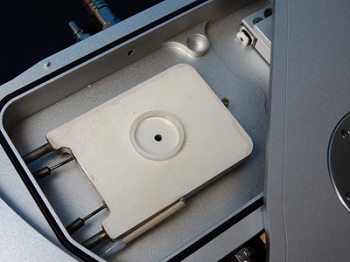Market leaders in temperature controlled microscopy, Linkam Scientific Instruments report on the use of their LTS350 stage at the University of Leeds to visualise and grow HEW lysozyme crystals.

The Institute for Particle Science and Engineering is a centre of excellence within the School of Process, Environmental and Materials Engineering at the University of Leeds. Researchers here focus on projects that address the engineering science of particulate processes and products. PhD and MSc students have been using an LTS350 hot-stage system in their research for several years. Currently, Research Fellow, Dr Jingjing Liu is using the stage in her experiments to study how protein crystallization is affected by growing the crystals in a larger quantity, and by changing the cooling rate.
Traditional methods for growing protein crystals are by micro plate sitting-drop crystallization, or by hanging-drop methods based on vapour diffusion. These methods yield a limited number of crystals but in biological research this is usually enough.
Each of the stages within the LTS range are well-suited to studying protein crystallization. These versatile heating and freezing stages consist of a large area temperature controlled element with a platinum temperature sensor embedded close to the surface for accurate measurements. The LTS stage has the facility to heat sufficient amounts of liquid within a crucible, which comes with a lid to prevent evaporation. The LTS350 system has now been replaced by the LTS420 which has the same features but has an expanded temperature range of -196°-420°C.
Dr Liu is using HEW lysozyme (Hen Egg-White lysozyme) and is trying to observe the behaviour of protein crystals within a population. To grow a population she uses a quartz crucible to crystallize them inside the LTS350 hot-stage. The number of crystals is proportional to the amount of liquid used within the crucible. The relatively large capacity of the quartz crucible is a distinct benefit in this research as Dr Liu can grow the HEW lysozyme crystals in a useful quantity. In addition the whole process of protein crystallization can be recorded by a video/camera system. She can also run experiments for over twelve hours, other systems prohibit such long experiments as the liquid can evaporate in the crucible.
Lysozyme forms part of the innate immune system of a wide number of organisms including mammals, and as a result is significant in the onset and control of disease. Hen egg-white lysozyme has been extensively studied and is the first enzyme structure to be solved by X-ray diffraction methods and first enzyme to be fully sequenced that contains all twenty common amino acids. Lysozyme hydrolyzes the beta-glycosidic linkage between N-acetylmuramic acid and N-acetyl glucosamine in the peptidoglycan of bacterial cell walls. Under a variety of conditions it has a consistent structure, making it ideal for crystallography studies.
Protein crystals have shown significant benefits in the delivery of biopharmaceuticals but the majority (with a few exceptions such as insulin) are not yet marketed in this way. Historically the work in this field is, Dr Liu says: "focused on investigations on crystal growth looking at the molecular and single crystal scales." She notes that this differs from her research as: "my research is focused on understanding the growth behaviour of the population of crystals which is clearly important to mass crystal growth."